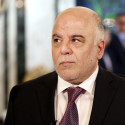Iraq’s prime minister on Wednesday appealed to the U.S.-led coalition and the international community to do more to help his country win the war against the Islamic State group, saying the assistance pledged so far falls short of the nation’s urgent needs.
In an interview with The Associated Press, Haider al-Abadi said the coalition has stalled on key issues, particularly commitments on training Iraqi forces and weapons deliveries.
“We are in this almost on our own,” he said. “There is a lot being said and spoken, but very little on the ground.”
His comments came as he was leaving for London to take part in a one-day meeting Thursday on the anti-Islamic State war effort with foreign ministers from about 20 countries, including Arab states. U.S. Secretary of State John Kerry is also expected to attend.
The fall of the western city of Fallujah a year ago this month kicked off the Islamic State group’s dramatic blitz across Iraq. In June, the extremists captured Iraq’s second-largest city, Mosul, then swept south toward Baghdad in a march that put almost all the Sunni-majority regions of northern and western Iraq into its hands. The Iraqi military crumbled, with troops abandoning the battle and leaving heavy weapons, which were later seized by the militant group.
President Barack Obama, in his annual State of the Union address Tuesday, pledged to work with Congress on a new authorization for military action against the Islamic State group in Iraq and Syria.
In November, Obama authorized the deployment of up to 1,500 more American troops to bolster Iraqi forces, which could more than double the total number of U.S. forces to 3,100. The Pentagon has made a spending request to Congress of $1.6 billion, focusing on training and arming Iraqi and Kurdish forces. According to a Pentagon document prepared in November, the U.S. is looking to provide an estimated $89.3 million worth of weapons and other equipment to each of the nine Iraqi army brigades.
“We want to see an acceleration of the training, acceleration of the delivery of arms,” al-Abadi added, reiterating that Iraq does not want any foreign boots on the ground, “but we need support and logistics.”
“We are fighting very hard to find resources to purchase arms,” said al-Abadi, who was named Iraq’s prime minister in September. “We are left almost alone to get these arms and munitions for the army, for our fighters, and we expect much more.”
The U.S. and its coalition allies have carried out more than 1,000 strikes in Iraq since its campaign began in August — as well as hundreds more in neighboring Syria. American officials say the campaign has been somewhat successful, though it is likely to stretch on for years.
On a visit to Baghdad last week, Gen. John Allen, the U.S. envoy to the anti-IS coalition, said that advise-and-assist teams are working to train and equip 12 Iraqi brigades to prepare them for retaking Fallujah and Mosul. But, he acknowledged, there is no timeline for an assault on those cities.
Despite that, Iraqi troops and pro-government militia fighters have fought fiercely, making slow gains against the IS militants in an area immediately north of Baghdad.
Iraqi and Kurdish forces have also been able to push Islamic State extremists out of parts of Diyala province on Baghdad’s northeast fringe. Further north, Iraqi and Kurdish ground forces retook the Mosul Dam in August with the help of U.S. airstrikes — an achievement that is now under threat. Kurdish Regional Security Council said Wednesday that Kurdish peshmerga fighters launched a new offensive to secure areas southeast and southwest of the dam.
The Iraqi premier said his country is grateful for the U.S.-led air campaign and that airstrikes have been effective.
“Bombing from the air has been very, very effective,” al-Abadi said. “We are very thankful for the air campaign to support our military, but I think you cannot achieve big things without a real fight on the ground.”
From London, al-Abadi is to travel to Davos to attend the World Economic Forum.

